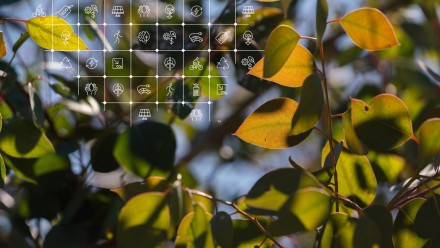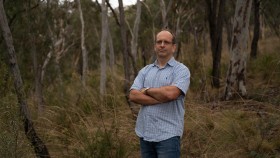ANU student interns help University towards Below Zero target
In 2022, undergraduate students Peter Phillippa and Tom Adams swapped-out their regular university lectures and tutorials to undertake semester-long for-credit internship positions with ANU Below Zero Initiative. The goal of the initiative is for ANU to achieve below zero greenhouse gas emissions by 2030 for energy, waste, work travel and direct on-campus emissions.
“I chose to get involved as the field of research excited me. It was something I wanted to learn more about, in order to eventually do my part to help reduce the impact of climate change,” says Peter.
Tom had similar feelings, finding work on climate change adaptation and mitigation interesting and challenging.
“Climate change is an important issue to me so helping an organisation deliver on its climate ambition was appealing,” he said.
As a part of their internships, Peter and Tom researched Australia’s Emissions Reduction Fund (ERF) and Carbon Credit options to determine how these could be best implemented by ANU to achieve the University’s 2030 below zero emissions target.
For his internship, Peter identified the carbon sequestration method that ANU should purchase carbon credits from to meet the ANU Principles for Carbon Removal.
“Going through the motion of research was the highlight of the internship for me. It was pleasing to be able to build a clear and accurate understanding of the ERF scheme using information from many different sources,” said Peter.
Tom worked to analyse and recommend suitable solutions for ANU to reach its short term climate goals.
“Specifically, my role was to identify and analyse the different available carbon credits that could be used to offset the university’s emissions,” he said.
Tom found that there is a shortage of ANU-quality carbon credits and suggested that ANU should focus on building partnerships, rather than purchasing carbon credits outright, to achieve the aspirations outlined by the ANU Principles for Carbon Removal.
“Peter and Tom’s projects built on one another,” said Below Zero Emissions Removal Manager, Caitlyn Baljak, who supervised the pair during their internships.
“By the conclusion of their internship both students produced well-researched reports and implementable recommendations for ANU to best achieve below zero emissions,” she said.
Both Tom and Peter spoke highly of their internship experience. In particular, they valued to the opportunity to gain work-experience and build research skills outside of the classroom.
“Just give it a shot,” said Peter. “You will get more out of it than you think, and it can be defining feature of you resume.”
“It was rewarding to participate in a completely different learning experience to my other subjects, this is a great transitional subject for any student looking to get work experience in a comfortable yet challenging work environment,” said Tom.










